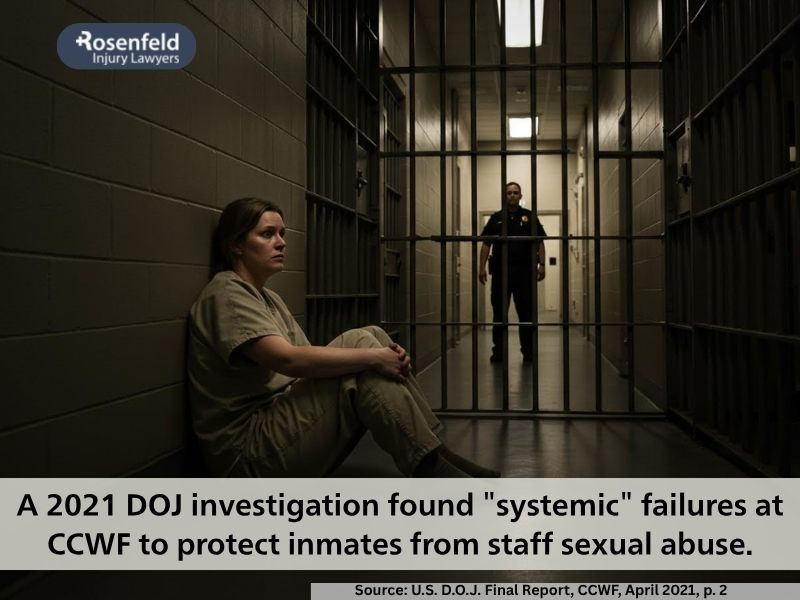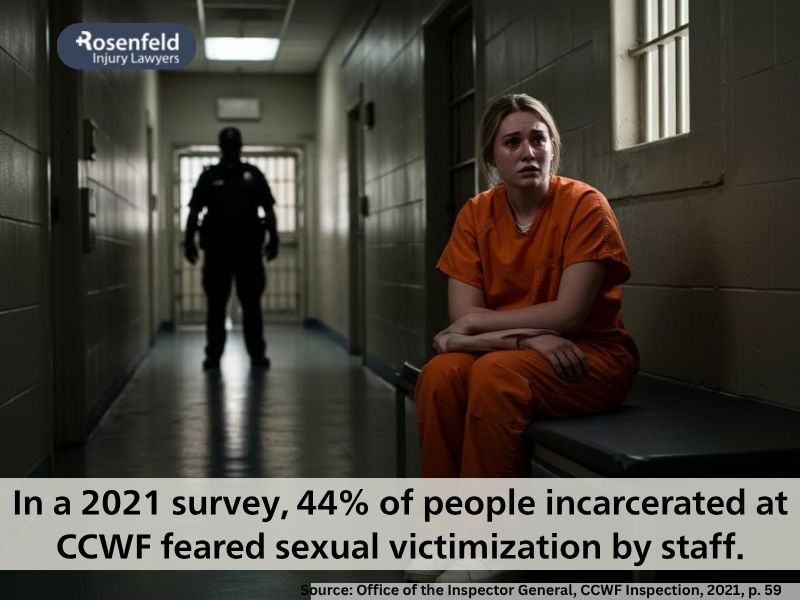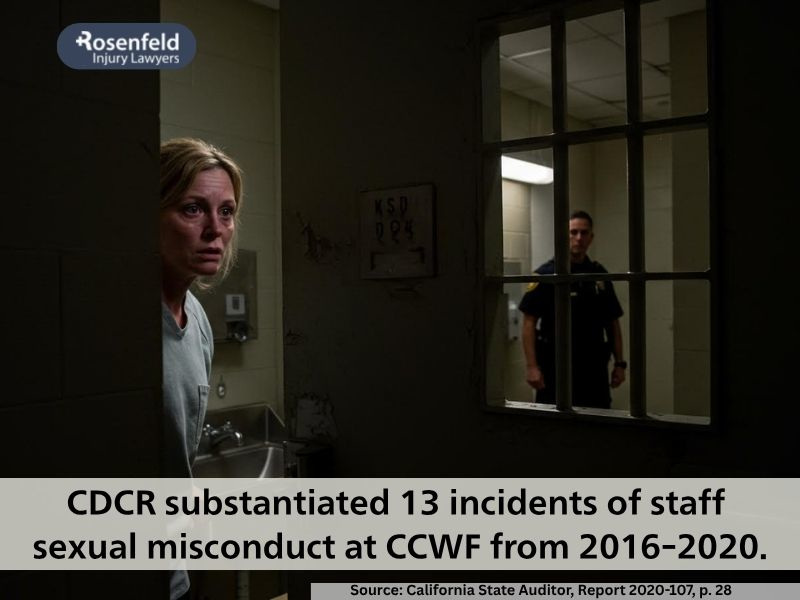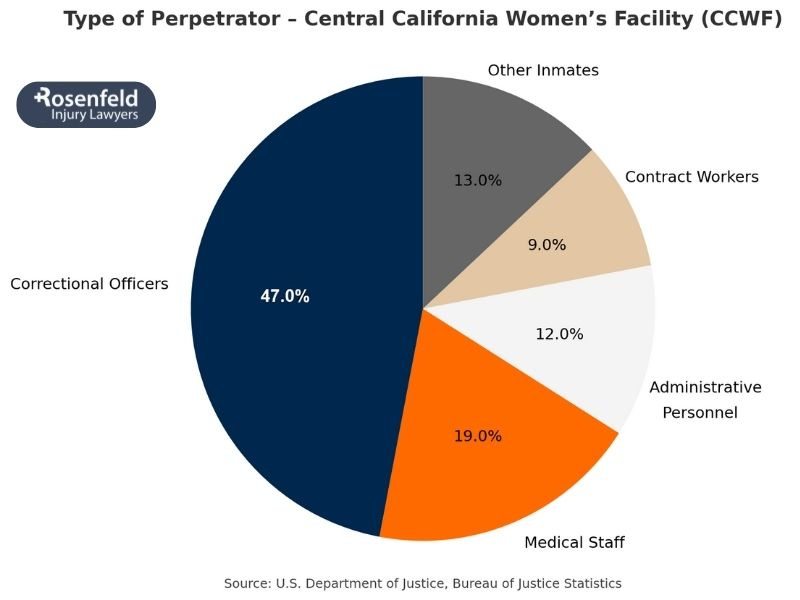Central California Women’s Facility Sexual Abuse Lawsuits
Compensation for Female Inmates Sexually Abused at CCWF in Chowchilla
A women’s prison is supposed to be a place for rehabilitation, but many inmates suffer from sexual abuse in these institutions in California. If you have suffered in a Central California Women’s Facility sexual abuse case, you can pursue compensation from the at-fault party with a civil lawsuit.
The Injury Lawyer Team is a law firm specializing in supporting victims as they seek justice and financial compensation for their suffering. Our team will ensure the at-fault party is held accountable for their actions.

Allegations of Rampant Sexual Abuse of Female Inmates in Central California Women’s Facility (CCWF)
One institution managed by the California Department of Corrections and Rehabilitation (CDCR) is the Central California Women’s Facility (CCWF) in Chowchilla. Multiple sexual abuse lawsuits have occurred in recent years against this facility.
- 2025 – A former correctional officer named Gregory Rodriguez was convicted of 59 felony counts of sexual abuse and five misdemeanor counts of sexual battery. The charges occurred because he had sexually assaulted multiple incarcerated women by luring them into a parole board hearing room with no cameras. The lawsuit, which involved numerous plaintiffs, was settled for $3.7 million.
- 2024 – 13 women filed a complaint against CCWF when one of the correctional officers led a group of other guards in a retaliatory action against 159 women using pepper spray and rubber bullets. The assault was in response to staff sexual abuse claims.
- 2023– Officer Israel Trevino Jr. was accused of abusing numerous inmates, who filed a lawsuit against him and other prison staff. Trevino had been abusing women at the prison for over a decade.
- 2021 – Warden Mike Pallares was accused of sexual harassment and coercion, threatening a female coworker if she did not have sex with him. Additionally, he was the warden during former correctional Officer Gregory Rodriguez’s abuse.
Sexual Abuse Settlements & Verdicts Recovered by Our Law Firm
Our California sexual abuse legal team has decades of experience holding abusers accountable and seeking compensation for victims. Here are some past settlements we have secured:
- $21,000,000 – Maria was a guest at a well-known Los Angeles hotel chain when she was sexually assaulted by an employee who should never have been hired. The lawsuit centered on the company’s failure to properly screen its workers and enforce basic safety procedures. The size of the recovery reflected the severity of her trauma and the corporate negligence involved.
- $15,000,000 – Several boys in the Bay Area were groomed and abused by a longtime private school coach who was left unchecked despite prior complaints. Their families pursued legal action, arguing that the school had ignored multiple warning signs and failed to protect the students in its care. The substantial settlement was driven by the number of victims and the school’s repeated failures to act.
- $6,500,000 – While traveling on a cruise ship that departed from the Port of San Diego, 16-year-old Emily was raped by a staff member who had unrestricted access to passengers. The case underscored how inadequate staff supervision created opportunities for abuse. The recovery was shaped by the serious lifelong impact of the assault and the company’s failure to maintain passenger safety.
- $3,000,000 – Lisa, a young mother in Sacramento, came forward after being repeatedly assaulted by her OB/GYN during routine medical visits. The hospital’s lack of oversight and failure to investigate earlier complaints were central factors in the case. The settlement helped hold a major institution accountable while recognizing the deep violation of patient trust.
- $1,160,000 – Seventeen-year-old Jacob was assaulted by a guard at a youth detention center in San Bernardino County. The case revealed systemic issues in the facility’s training and supervision of staff. His recovery reflected not only his personal injuries but also the risk of similar harm to other vulnerable teens.
- $1,000,000 – Anthony was just 12 when a supervisor at an after-school program in Oakland abused him. Parents later discovered the organization had no meaningful safeguards or reporting systems in place. The settlement reflected both the emotional toll on Anthony and the accountability demanded from youth programs entrusted with children’s care.

Why Choose Injury Lawyer Team
If you have suffered sexual abuse in any context, you need an experienced lawyer from a top sexual abuse law firm to help with your claim. At Injury Lawyer Team, we have maintained an A+ grade from the Better Business Bureau and a five-star rating from AVVO.
Types of Sexual Violence Against Female Inmates in California State and Federal Correctional Institutions
Inmate and staff abuse are rampant in many California prisons, and many of them lead to correctional facility sexual abuse lawsuits like those mentioned above. Numerous types of sexual misconduct can lead to a lawsuit:
- Sexual abuse by correctional officials and other staff
- Sexual harassment during intake, such as strip searches or pat-downs
- Abuse of power in demanding sexual favors
- Inmate-on-inmate abuse allowed by staff negligence
- Retaliation against victims and cover-ups when abuse is reported
What Are the Most Common Causes of Sexual Abuse in Central California Women’s Facility?
Our duty is to hold people responsible for allowing or engaging in abusive activities in prisons like Central California Women’s Facility (CCWF). Here are some of the most common causes of abuse in these facilities:
- Lack of oversight – Prison staff fail to monitor inmates to prevent these situations
- Inadequate training – Guards and other employees are not equipped to handle sexual violence or properly report it
- Understaffing – If there are too few staff members at the prison, it can create more vulnerable circumstances for victims
- Corruption and cover-ups – When sexual abuse is reported, it may be swept under the rug to protect employees or management
- Systemic retaliation – If the facility has a history of punishing those who report abuse, it can prevent future victims from speaking up
What Are the Most Common Injuries Female Inmates Sustain?
Sexual abuse can have physical and emotional consequences for the victim. The impact of forcible rape or other types of abuse can affect how much compensation you may earn in a lawsuit.
Here are some common injuries suffered by incarcerated women who are being abused:
- Physical injuries – Bruises, lacerations, broken bones, and physical trauma that can lead to hospitalization
- Reproductive health complications – Female survivors of sexual abuse may develop lasting reproductive injuries, which can lead to infections, chronic pain, or pregnancy
- Psychological trauma – While physical wounds may heal, mental health can be affected long after the abuse occurs, causing PTSD, depression, and anxiety
- Difficulty reintegrating into society – Former inmates who have been sexually abused may struggle to reintegrate into society upon their release, leaving them feeling isolated and unsupported
What Damages Can Sexually Abused Female Inmates Recover in Civil Lawsuits in California?
Holding a California institution accountable for sexual abuse can lead to a financial settlement for legal damages. These losses can include:
Economic Damages
- Medical expenses
- Future medical costs
- Diminished earning capacity
- Lost wages
Non-Economic Damages
- Emotional distress
- Pain and suffering
- Disfigurement
- Loss of enjoyment of life
Punitive Damages
- Awarded in cases of gross negligence or intentional misconduct, such as sexual abuse by a correctional officer

What Is the Average Women’s Prison Sexual Abuse Payout in California?
In California, the average sexual abuse claim payout for a female inmate is $400,000. Multiple factors will affect the outcome of your case, such as injury severity, emotional impact, long-term effects, liability, and insurance policy limits.
Why You Need a Women’s Prison Sexual Abuse Lawyer
Suffering from sexual misconduct as a female inmate is a unique challenge. Most people cannot understand the trauma or financial implications of such a case. At Injury Lawyer Team, we have the experience needed to help you overcome numerous challenges with your claim, such as:
- Survivor intimidation – Many of our clients fear retaliation from the prison or government entities when speaking out, especially when staff members in prisons hold all the power.
- Lack of transparency – Prisons are famous for covering up instances of abuse, especially since they are designed to protect themselves. Survivors rarely have access to the evidence they need, but our lawyers can help you overcome those barriers.
- Complex federal and state laws – For an abuse case, you may contend with federal laws and California regulations. Injury Lawyer Team will ensure you can navigate the legal process properly while your rights are protected.
- Specialized evidence gathering – Proving abuse in a prison can take a lot of work to find the right evidence, and our team is committed to securing complaint reports, surveillance footage, and trauma expert testimony.
How Common Is Sexual Assault and Abuse Among Female Inmates in California?
According to the Bureau of Justice Statistics, there is a massive gap between the number of alleged sexual abuse incidents in prisons and those that are substantiated. In 2019, there were 236 reports of non-consensual sexual acts that involved prisoners, but only six of these were substantiated. There were also 168 reports of abusive sexual contact, with five cases being substantiated.
What Laws and Civil Rights Govern Lawsuits Filed for Female Inmate Sexual Abuse in California?
Here are some laws that may apply to your claim:
- The Prison Rape Elimination Act of 2023 (PREA) – Standards for investigating, preventing, and responding to sexual misconduct in correctional facilities.
- 42 U.S.C. §1983 – Survivors can bring claims against the state for violating constitutional rights.
- Article I, § 17 – No cruel or unusual punishment, which includes the failure to protect incarcerated people from assault or sexual abuse by staff.
- California Civil Code § 52.1 (Bane Act) – A civil lawsuit is allowed if a person’s constitutional rights are violated through threats, intimidation, or coercion.
- California Government Code § 815.2 & § 820 – Public entities can be held liable for injuries caused by acts or omissions of employees.
- California Penal Code § 2635–2639 – It is a crime to engage in sexual acts with incarcerated individuals, even if consent is given.
How Long Do Sexually Abused Female Inmates Have to Take Legal Action in California?
Under Cal. Code Civ. Proc. § 340.16, survivors have either ten years from the abuse or three years from the discovery of the injury, whichever is later, to pursue a civil claim. If you were a minor at the time of the abuse, you have until age 40 or five years after discovering the abuse to pursue legal action.
When suing government or state agencies, claimants typically must file an administrative claim with the state within six months of the incident.
Who Is Legally Liable for Sexual Abuse in Women’s Correctional Facilities?
Multiple parties may be liable if you were sexually abused in a facility managed by the California Department of Corrections and Rehabilitation (CDCR), including:
- Prison officials and staff members
- Supervisors and wardens
- The CDCR
- The Federal Bureau of Prisons
- Private prison corporations
Common Defenses in Sex Abuse Cases Involving California Prisons
Whether you are suing correctional staff or the facility itself, defendants will use various tactics to undermine your claim and avoid a potential payout:
- Claiming that there was consent for the activity
- Claiming that the statute of limitations deadline has passed
- Arguing that there is no evidence of wrongdoing
- Undermining the credibility of the victim
Our legal team can counter some of these arguments by gathering additional evidence, such as past abuse reports, surveillance footage, medical records, trauma expert testimony, witness statements, and correctional facility expert testimony.
How to Strengthen Your Women’s Correctional Facility Sexual Abuse Case in California
If you are abused in a women’s prison, building a strong claim starts the moment the incident occurs. Here are the steps you should take:
- Report the incident to facility administrators, following the appropriate procedures
- Seek medical attention for your injuries
- Preserve evidence of the abuse, such as clothing, photos of injuries, or other physical evidence
- Consult the Injury Lawyer Team for legal assistance against the correctional staff or the women’s prison
How a California Women’s Prison Sexual Abuse Lawyer Can Help
Our law firm specializes in supporting victims throughout a complex claims process, allowing them to focus on their physical and emotional recovery.
Our legal services include:
- Investigating the abuse
- Researching past reports
- Assessing legal damages
- Gathering evidence
- Negotiating with insurance companies
- Litigating in civil court if necessary

FAQs
How much does a women’s prison sexual abuse attorney cost in California?
At Injury Lawyer Team, we work on a contingency fee basis. This means you owe nothing unless we win your case.
Who can file a women’s prison sexual abuse claim?
Typically, a sexual abuse claim is filed by the survivor of the event. However, if the victim is a minor, a guardian or legal representative can file the claim on their behalf.
Can I file a lawsuit if I never filed a formal complaint at the facility?
Yes, you can pursue legal action against the women’s prison if you did not file a formal complaint immediately after the abuse. The fear of retaliation often keeps victims silent for years, and the California legislature recognizes this reality. You can still bring a lawsuit against the prison, using evidence such as witness testimony and medical records.
Can I file a lawsuit if the person who abused me was never criminally charged?
Yes, sexual assault lawsuits against women’s prisons and criminal charges are separate processes. For example, if you were a victim of inappropriate groping but there was never a criminal case, you can still seek damages via a civil claim. On the other side, an abuser being charged for their crimes can also be the defendant in a civil case.
Are there any protections for survivors who face retaliation for reporting?
Multiple laws are in place to protect survivors of sexual abuse who want to report their abusers, such as the Prison Rape Elimination Act, the Bane Act, and civil rights laws. These regulations forbid retaliatory actions by prison staff, especially a peace officer or guard. Retaliation can lead to massive lawsuits against the facility by incarcerated residents.
Book a Free Consultation
Injury Lawyer Team is prepared to help you pursue justice against the California Department of Corrections and Rehabilitation or CCWF. Incarcerated women often face an uphill battle to hold their abusers accountable, but our team is committed to fighting for fair compensation.
With a contingency fee agreement and a free consultation, there are no upfront costs for our services. Contact us today to schedule a free consultation on your eligibility to file a sexual assault lawsuit against a women’s prison.
All content undergoes thorough legal review by experienced attorneys, including Jonathan Rosenfeld. With 25 years of experience in personal injury law and over 100 years of combined legal expertise within our team, we ensure that every article is legally accurate, compliant, and reflects current legal standards.








